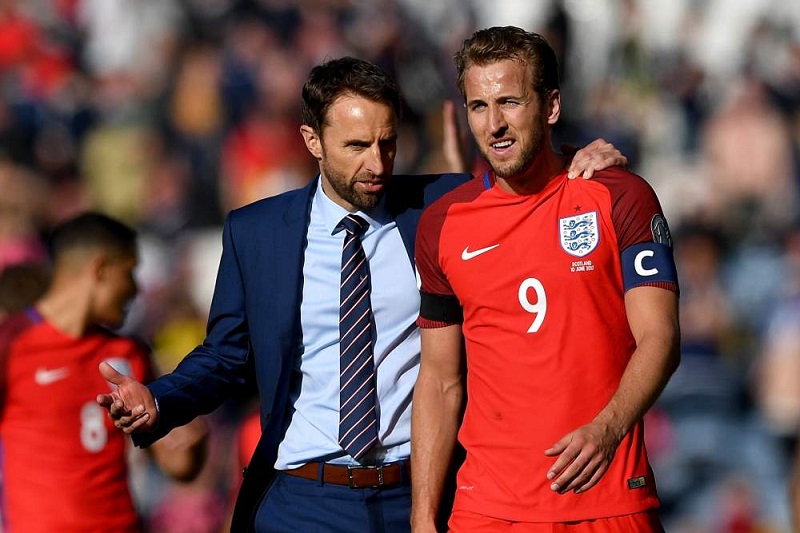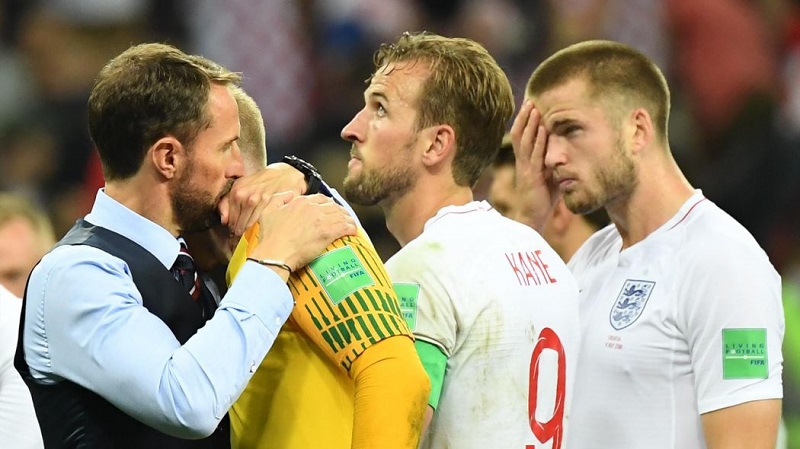By
PADDY O’DEA
This article featured in The Business Post on 19 July 2018.

This time two years ago, an exasperated and emotional former England international, Chris Waddle, reflecting on England’s 2-1 defeat to Iceland at Euro 2016, proclaimed: “They’re all pampered, they’re all headphones, and you can’t get anything out of them.”
Waddle’s outrage at England’s limp exit from the Euros to an inferior side summed up the feelings of many fans and media alike at that time. The English players were ‘perceived’ as distant, disinterested, guarded and detached from the communities they were expected to represent.
More sensible people would appreciate that this was the ‘perception’ rather than the reality, but the team ultimately failed to communicate this to the general public.
World Cup nostalgia, viral videos and Harry Maguire memes
Fast forward 24 months, and this unfiltered anger has been replaced by a very different narrative: one of unity, pride and unbridled joy. This new English story has caught many people by surprise, manifesting itself in an avalanche of World Cup nostalgia, on-street parties, viral videos, Harry Maguire memes, and the lionising of a new generation of very ‘relatable’ footballers.
While England’s recent performances on the pitch have clearly played a central role in this sea change in attitudes toward the national team, the feel-good factor took root long before a ball was kicked in Russia.
In the months leading up to the World Cup, the English FA and manager Gareth Southgate recognised a clear apathy towards the national team among supporters, and a strained relationship with media that was proving counterproductive both on and off the pitch.
Addressing the toxicity
Led by Southgate, the FA embarked on a new PR campaign aimed at fostering openness and goodwill between the team, the media and the supporters. Ultimately, this would help to alleviate the players from the toxicity and pressure of recent tournaments.
This new departure was probably best illustrated first by the unprecedented levels of access afforded to media in the build up to the tournament, and secondly, by the ease with which the English players took to it.
Many players embraced the opportunity to show off a little bit more of their personality and share their stories. Danny Rose opened up about his recent struggles with depression. Raheem Sterling hinted at a difficult childhood and the challenge of losing his father at a young age.

In effect, this greater openness humanised many of the players and made them more relatable to the media and supporters. In other words, it becomes more difficult to criticise a young man we feel we know and like, versus a ‘pampered, headphones-wearing’ Premier League footballer.
When England’s World Cup run came to an end, tellingly, the English media chose to celebrate their young ‘heroes’. The Daily Mail spoke of ‘a band of brothers’, The Daily Mirror proclaimed them ‘national treasures’, and The Daily Telegraph urged the team to ‘hold their heads high’.
Applying these principles in business and beyond
These principles of openness and transparency equally apply to any high-profile or highly scrutinised brand or institution.
It is much easier to lay blame at the feet of a faceless corporate entity than it is a business that tells its story, engages with its community, strives to do the right thing, and holds its hands up when it falls short.
When tensions between US police forces and African-American communities were at their peak in 2016, police chiefs, politicians and community leaders were dragged into an ugly debate and asked to pick sides. The Flint Michigan Police Department, one of the more scrutinised forces in the US, instead opted to open its doors to Netflix and tell its story, warts and all, in an eight-part series, Flint Town.

By doing so, it was able to communicate the myriad complexities faced by its officers every day, including inadequate resourcing, tensions in the community, and low morale. Importantly, the documentary showed the police’s efforts to address these issues. While this policy of openness hasn’t solved all their problems, it has certainly earned them some goodwill.
In Ireland, Lidl’s efforts to tell their corporate story, talk about their Irish suppliers, and demonstrate their commitment to their staff has endeared them to the community. The well-publicised rise of JP Scally, son of a retired Westmeath dairy farmer, through the Lidl graduate programme to managing director is a perfect example of the brand’s ability to tell its story and demonstrate its openness and connection with the community.
To be clear, none of these institutions are pursuing a strategy of openness for openness’ sake. Rather, it is a calculated understanding of the value of being able to show ‘we have nothing to hide’.
In short, whether you’re a national sports body, a local police force or an international retailer, all large institutions have their challenges and vulnerabilities, and by extension will either fulfil the role of hero or villain in a given news story.
Nuance and balance are usually the first victims of breaking news. Those whose starting point is one of openness and engagement will always have the edge on those who favour stone walling, detachment and secrecy.
PADDY O’DEA
Paddy is a Client Director at PR360. He helps clients create engaging corporate stories, cut through the noise, and advance their business objectives. He is most happy when buried under a pile of newsprint.

